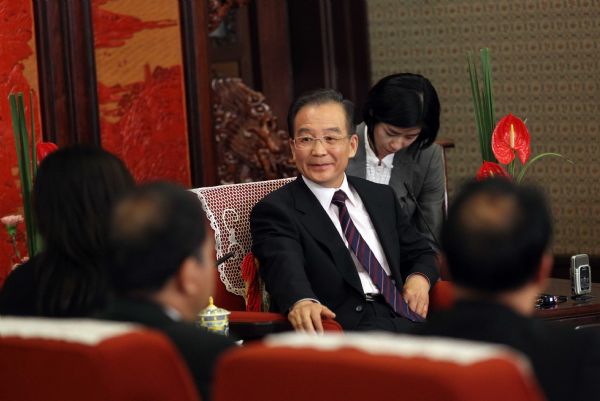China cherishes ties with Malaysia, Indonesia
 |
|
Chinese Premier Wen Jiabao speaks to Malaysian and Indonesian media during a joint interview in Beijing, capital of China, April 25, 2011. Shortly before his official visits to Malaysia and Indonesia, Chinese Premier Wen Jiabao gave a joint interview to journalists from the National News Agency and the Star of Malaysia, and the SCTV, Kompass and the Jakarta Post of Indonesia, and answered their questions here Monday. [Liu Weibing/Xinhua] |
Shortly before his official visits to Malaysia and Indonesia, Chinese Premier Wen Jiabao gave a joint interview to journalists from the National News Agency and the Star of Malaysia, and the SCTV, Kompass and the Jakarta Post of Indonesia, and answered their questions in Beijing Monday. The following is the transcript of the interview.
Wen Jiabao: First, I would like to extend warm welcome to the friends from the press of Indonesia and Malaysia. In a couple of days, I will visit Indonesia and Malaysia. It will be my first official visit to Indonesia as the Chinese Premier and my second visit to Malaysia in six years. I feel delighted to have the opportunity to visit these two countries because both countries have a long history of exchanges with China and both are China's good brothers and close neighbors. I hope that the friends from the press of the two countries will convey my cordial greetings and best wishes to the people of Indonesia and Malaysia. Now I am ready to answer your questions.
Journalist: Could you tell our audience your impression about Indonesia and how do you comment on the current Indonesia-China relations? The Chinese government has mapped out its 12th five-year plan on economic and social development and the Indonesian government has determined its medium and long-term economic blueprint. How will the two countries develop their bilateral relations and translate the opportunities they face into real benefits for both China and Indonesia?
Wen Jiabao: Indonesia is a country with vast expanse of territory, rich natural resources and a big population. With a long coastline and a lot of islands, it is renowned as "Emerald of the Equator". Exchanges between China and Indonesia have a time-honored history. In recent years, relations between the two countries have enjoyed more rapid development. I had come to know this country when I was very young and could hum the tune of such famous Indonesian folk songs as "Buteh" and "Ayo Mama". Contacts between our two countries date back to 2,000 years ago. The eminent Chinese monk Fahien visited Indonesia in the 4th century AD. In the 8th century AD, the eminent Chinese monk Yijing visited Indonesia and during that time, a large number of Chinese started to migrate to Indonesia. In my meeting with Speaker Marzuki Alie of the Indonesian House of Representatives a few days ago, he told me some historical episodes between China and Indonesia. He said that he was born in Sumatra and many of the local Sumatra people look very much like Chinese, and that he thought that he is of Chinese descent too. The most famous historical episode in our exchanges is the Western Seas voyages by Zheng He, the famous Chinese navigator, a Muslim, in fact, in the early 15th century. He helped build several mosques in Indonesia and some of these mosques are still well preserved.
I believe the most important and memorable episode in our exchanges in the 20th century is the Bandung Conference. Premier Zhou Enlai and President Sukarno made tremendous joint efforts for the success of the conference. And the ten important principles for the peaceful coexistence of Asian and African countries were inaugurated there. In order to know more about that important historical event, I once paid a special trip to Bandung. I cherish a very fond impression of Indonesia.
You mentioned in your questions that China has formulated its 12th five-year plan on economic and social development and Indonesia has set out its blueprint for medium and long-term economic development. I believe they represent important opportunities for cooperation between our two countries. To seize these opportunities and translate them into concrete results, I believe we need to take steps in the following six areas:
First, we should enhance high-level exchanges, establish a mechanism for regular mutual visits at the leadership level and increase mutual political trust. Second, we should enhance economic cooperation and trade. The two countries can make use of the China-ASEAN FTA and other mechanisms to intensify cooperation in energy, infrastructure development and such important sectors as manufacturing, agriculture and fishery. Third, we need to step up maritime cooperation, including maritime security, navy-to-navy exchanges, anti-terrorism joint exercises and military drill. We also need to pay attention to the marine economy, marine resources development and marine science and technology, and forecasting and disaster relief of earthquakes and tsunamis. Fourth, we need to strengthen cultural and people-to-people exchanges. We need to enhance our exchanges in science, technology, culture and education and increase personnel interflow. Educational cooperation and people-to-people exchanges represent the future of our friendship and form the foundation of our cooperation. We need to work together for early conclusion of the agreement on mutual recognition of degrees and diplomas, and increase the exchange of students. This is highly meaningful for both countries. Fifth, we need to enhance our cooperation under the China-ASEAN framework. Indonesia holds the presidency of ASEAN this year and we hope Indonesia will continue to play an active and constructive role in promoting China-ASEAN cooperation. Sixth, we should step up cooperation on major international and regional issues. Indonesia is a member of the Group of 20. It is now a major emerging market economy. The country enjoys increasingly extensive influence in Asia and beyond. We hope that our two countries will step up consultation and cooperation in international affairs and make joint contribution to promoting world peace, prosperity and progress. Thank you.
 0
0 







Go to Forum >>0 Comments